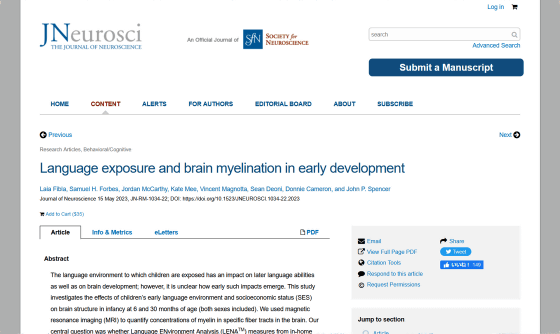It turns out that talking to infants a lot causes changes in the development of the language area of the brain

It is widely believed that speaking a lot from an early age promotes the development of language skills, and in fact,
Language exposure and brain myelination in early development | Journal of Neuroscience
https://doi.org/10.1523/JNEUROSCI.1034-22.2023

How talking to toddlers boosts early brain development
https://www.uea.ac.uk/news/-/article/how-talking-to-toddlers-boosts-early-brain-development
Talking to babies may contribute to brain development – here's how to do it
https://theconversation.com/talking-to-babies-may-contribute-to-brain-development-heres-how-to-do-it-205692
Talking to babies may help shape brain structure, research finds | Language | The Guardian
https://www.theguardian.com/science/2023/may/15/talking-to-babies-may-help-shape-brain-structure-research-finds
Previous research suggests that talking a lot with young children benefits cognitive skills and vocabulary. Therefore, a research team led by John Spencer , a professor of psychology at the University of East Anglia in the United Kingdom, attached a small recording device to 87 infants aged 6 months and 76 infants aged 2 years and 6 months, and tested them for 3 days. I recorded audio from everyday life.
The research team analyzed a total of 6208 hours of voice data collected from 163 infants and investigated how much conversation the children were exposed to. As a result, it was found that children with mothers with higher educational backgrounds hear more words in their daily lives and speak more words themselves.

In addition, the research team invited 84 children to a quiet room in the hospital and performed an MRI scan at sleep timing to analyze the structure in the brain. They found that the amount of
Normally, the amount of myelin increases as the brain develops. The research team reports that children aged 2 years and 6 months who heard more languages had more myelin in the language areas of the brain. In contrast, six-month-old infants said that the more language they heard in their daily lives, the less myelin in their brains.
'Myelin is made up of protein and fat and forms an insulating layer around cranial nerves, which makes the brain's signals more efficient,' Spencer said. 'Think of it: Myelin is like wrapping a hose with duct tape, insulating nerve fibers and bringing more signals to brain areas.'
It is unknown why infants aged 2 years and 6 months had higher amounts of myelin in verbal areas the more words they heard, whereas infants aged 6 months had less myelin. However, Spencer said, ``One possibility is that this result may be related to differences in brain development during the first few years of life. Being busy and listening to a lot of words can help your brain grow.'

Mr. Spencer argues that it is important for parents to have more conversations with their children in response to the results of this study. On the other hand, University of London cognitive neuroscientist Saroni Krishnan said that while the results of the study were certainly informative, they did not prove that talking to children more caused myelin formation. pointing out.
``It is not clear whether increased myelin in the language domain has implications for future language and cognitive development, or whether this pattern is stable throughout childhood,'' Krishnan said. Children who are exposed to multiple languages and have increased myelination inherit genes from parents with high verbal proficiency, and this potential genetic influence needs to be investigated before attributing the problem to the language environment. ' said.
Related Posts:
in Science, Posted by log1h_ik







